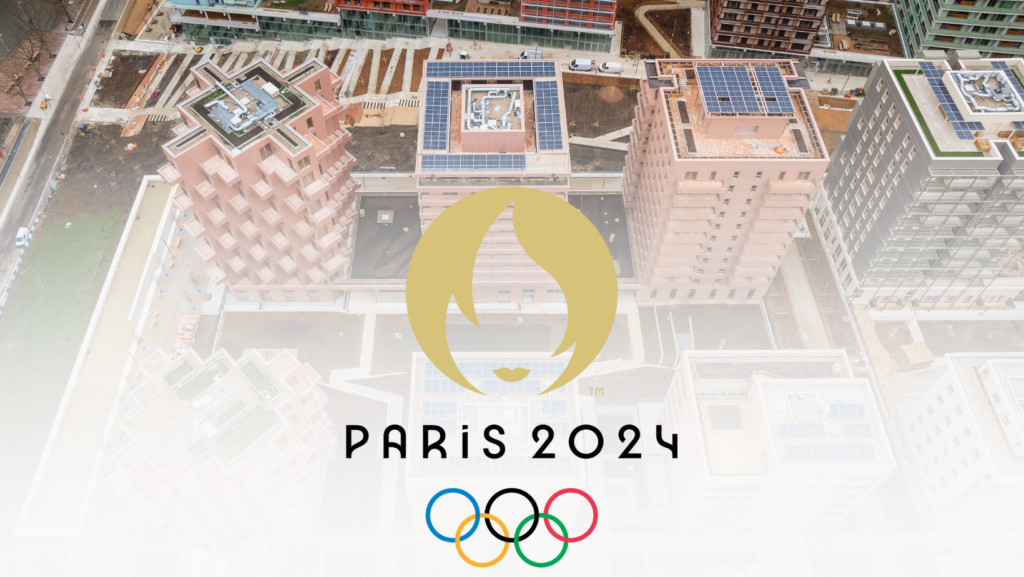
Paris is gearing up for a groundbreaking Olympic Games, fully embracing the principles of Olympic Agenda 2020*. The organisers are focused on delivering an event that’s not just spectacular but also more responsible, sustainable, and inclusive than ever before. They have put forward an ambitious plan to slash the carbon footprint associated with the Games by half, compared to previous editions while rolling out innovative strategies across various fronts, from energy and food to venues, transportation, and digital services, all aimed at making 2024 Games truly forward-thinking and impactful.
The Paris 2024 organising committee has created a carbon budget that includes all the aspects of the Games, from construction, transport, catering and procurement. Paris 2024 aims to slash carbon emissions by half compared to the average emissions from the London 2012 and Rio 2016 Olympics. They’re not just focusing on direct emissions but also considering the indirect impacts, like the carbon footprint of spectators traveling to the Games. By doing this, Paris 2024 is set to host the first Olympics in line with the goals of the Paris Agreement on Climate Change, which was adopted in 2015.
The organisers have adopted a clever way to sidestep carbon emissions. They’re going all-in on renewable energy for the Games, leaving little room for diesel generators. The ones they do need will run on biofuel, H2, or batteries. Plus, they’re making sure all venues are plugged into the grid, steering clear of short-term energy fixes.
The competition arenas have also been taken into account. More than 95 per cent of the venues to be used are either pre-existing or temporary. The rest that are built, are built with a long-term vision and have been built with low carbon construction methods. For example, the Aquatics Centre is designed to benefit the Seine-Saint-Denis community for the years to come after the Games. The 4680 square meters of solar panels on the rooftop of the facility will power the stadium and serve the community afterwards. The seats in the stadium have been built with recycled plastic waste from the community.
Three-quarters of the two million sports equipment to be used will be rented or provided by sports federations. The electronic goods such as computers and screens or other necessities like bungalows or tents will also be rented. According to IOC’s reports. 90 per cent of the 6 million assets will be taken back and reused by the partners and the organisers are working on a second life plan for the rest 10 per cent of the assets.
Also Read: Olympics™ Go: Paris 2024 – Igniting the Olympic Spirit Worldwide Through Your Screens
For any Games, the Games village hold a special attraction. The Olympics Games village will be transformed into a residential and business district that will provide employment to more than 6000 people and residential apartments to 6000 more. One-fourth of these homes will be set aside for public housing, meeting the needs of 40 per cent of Saint-Denis residents who depend on it. Another third will be available as affordable rentals, overseen by government-linked organisations and aimed at students and low-wage earners. By adding restaurants, shops, and recreational facilities, they hope to boost the local economy, where unemployment rates are currently over 20 per cent.
Paris 2024 committee doesn’t overlook the Games transport system. They’re making the most of the city’s extensive public transportation system and is adding over 400 kilometre of new bike lanes. With more than 80 per cent of Olympic venues within 10 kilometres of the Olympic Village, athletes won’t have to travel far. All venues will be reachable by public transport, which is expanding by 15 percent during the Games. Toyota, a Worldwide Olympic Partner, will provide electric, hybrid, and hydrogen-powered vehicles for athletes and accredited participants. They’re also optimising the vehicle fleet to use about 40 percent fewer cars compared to past Games, reducing the overall impact.
*Back in December 2014, during a meeting in Monaco, the International Olympic Committee (IOC) adopted Olympic Agenda 2020. This was a collection of 40 specific suggestions aimed at protecting the core values of the Olympics and enhancing the significance of sports in our communities.
Also Read: Paris 2024: Empowering Social Businesses for a Sustainable Olympic Legacy
[NB: The insights to this article have been taken from olympics.com]



